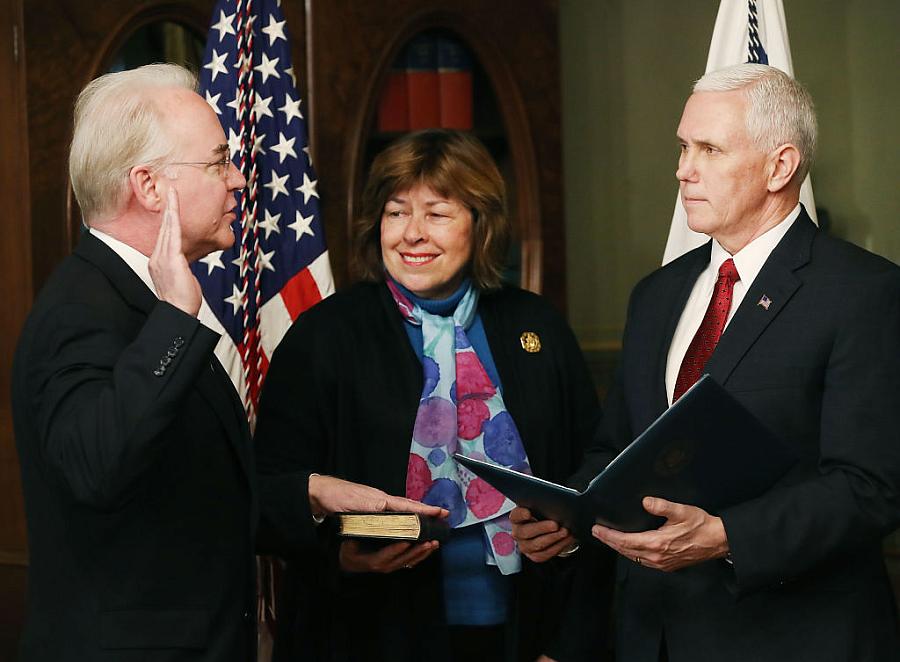The stories every health care journalist should be tracking in the coming weeks

(Photo: Mark Wilson/Getty Images)
This year, news about health care reform will be prominent and the role journalists play in filtering its coverage will have a huge impact on the outcome. The combination of our 24/7 news cycle and the prominence of the “repeal and replace” theme in the 2016 campaign means every corner of the health care industry will be in the spotlight. In the weeks ahead, the intensity of this coverage will increase and with it, the gravity of the role health care journalists will play. These stories will likely be the most prominent:
- Insurers will learn how the Department of Health and Human Services (HHS) intends to address their concerns about the individual insurance marketplaces and bigger issues about the regulatory constraints under which they’ll compete going forward.
- The 2018 fiscal year federal budget will be presented, and funding for Medicaid and Medicare, together almost 30 percent of the federal budget, will be closely scrutinized.
- Newly confirmed HHS Secretary Tom Price will unveil his pro-physician strategy initiating relaxation of burdensome reporting requirements in meaningful use and suspending mandatory bundled payment programs.
- David Shulkin will be confirmed as secretary of Veterans Affairs and advance his veterans’ health modernization strategy.
- Supreme Court nominee Judge Neil Gorsuch will begin his Senate confirmation journey, which will no doubt draw attention to his opinions in key 10th Circuit Court cases challenging the ACA’s contraception coverage provisions (Hobby Lobby Stores Inc. v. Sebelius, Little Sisters of the Poor v. Burwell). In each, he sided with the challengers’ contention that the ACA could not compel religiously affiliated organizations to adhere to its coverage dictum.
- Fourth quarter 2016 earnings announcements by health industry heavyweights in every sector will likely draw more attention to expected strong profits in the device and biopharma sectors.
- And members of Congress, who begin a 10-day recess at the end of this week, will be in their districts hosting potentially contentious town halls about the future of the Affordable Care Act and their views about what’s next.
As this list suggests, media coverage about our health system and its future is once again prominent. The bad news: Some of what has been reported is misleading or factually inaccurate and it doesn’t appear the public is better informed, in spite of this avalanche of coverage. That’s the inherent risk associated with a free press and sophisticated spin machines that seek to direct popular opinion toward their particular points of view.
It’s compounded by the fragmentation of the media industry itself: Viewers and readers seek information from a handful of sources they trust, and screen out all others. The result is the reinforcement of strongly held views, but the lack of an informed electorate. Who could have imagined we’d hear about “alternative facts” and “fake news?” But they’re accepted into our lexicon, though they cause angst among serious journalists.
Here’s my take: health care reform is too important to be delegated to our broken political process. While office seekers and holders pursue public service in good faith, party politics and the pursuit of media attention too often trump meaningful discussion and informed debate. During the two-hour Sanders-Cruz debate, CNN showcased a sharp contrast of viewpoints and a few nuggets about what “access” means and how drug prices might be contained. But for the most part, civil discourse organized by journalists seeking to inform like this debate is rare. We need the media to facilitate more of these discussions.
Though health care is complicated, it is incumbent that health care journalists separate spin from substance and provide clarity. Sometimes, media are complicit in dumbing down health care issues, allowing politicians and partisan surrogates to bark talking points without probing for the facts and underlying rationale on which such views are expressed. Too often, health care journalists allow their sources to use talking points — like rationing, affordable health care, quality of care, access to care, and so on without probing deeper and explaining what such terms really mean. And frequently, health care journalists accept pronouncements from health care organizations and elected officials at face value and fail to verify the underlying facts.
Health care is 18 percent of our economy and the fastest growing out-of-pocket category of expense in household spending. At $9,500 per capita, it’s expensive, complicated and often unaccountable. That’s why health care journalists must first be informed about industry trends, issues and policies and then be prepared to ask the tough questions. It’s serious business.
Paul H. Keckley, Ph.D. is the editor of The Keckley Report and a health policy expert. He has served in several industry, government and academic leadership positions in health care, and has authored three books.

